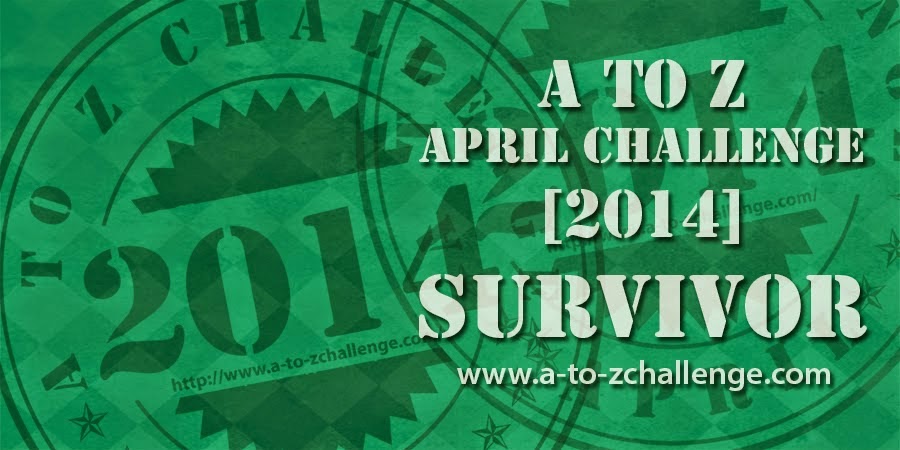H – Hook
04/09/2014 6 Comments
 For many of the letters of the A to Z challenge, I had ideas pouring out for what to write about, and I started organizing things to not overlap too much, discuss different topics, to be short, personal and opinionated, and of course writing-related. For a few letters, I was left hunting a bit for words. Just so with H, where I found the essential writing term “Hook.” I had forgotten this term, but it is of course one I know and employ, or even over-employ, in my writing. I know when I first did NaNoWriMo, every chapter started with a hook sentence, In Media Res, and the action caught up with it.
For many of the letters of the A to Z challenge, I had ideas pouring out for what to write about, and I started organizing things to not overlap too much, discuss different topics, to be short, personal and opinionated, and of course writing-related. For a few letters, I was left hunting a bit for words. Just so with H, where I found the essential writing term “Hook.” I had forgotten this term, but it is of course one I know and employ, or even over-employ, in my writing. I know when I first did NaNoWriMo, every chapter started with a hook sentence, In Media Res, and the action caught up with it.
However, that got me thinking of the other sorts of ways the idea of the Hook comes up in our world today. What began its life as a writing technique has become something of a way of life in our information-heavy world.
For instance, in blogging, or other sorts of writing online. They say that for search engines, you really want to have your keywords in the earliest parts of your post. That effectively, the search engines are optimized to consider your hook. Also, in RSS feeds, you generally only see the first bit of the post, and this is the Hook that gets people to click-through and read more of your post. Thus, in blogging, the Hook is an essential tool to get read – without a good Hook, the post is likely dead in the water.
By this standard, I’m pretty sure this post fails!
Thinking about the Hook in terms of blogging got me thinking about it in terms of the rest of the Internet in general. And in particular, some of the ways in which the Internet approaches these things like a Journalist. That is to say, we think about webpages in terms of what is “above the fold” (like with a newspaper) – the content that you can generally see without scrolling down, as this is the most-seen content. And really, the first paragraph being the Hook is a heavily used Journalism approach to writing.
And what about Social Media? Twitter in many ways functions as a giant Hook machine – at least, any tweet with a link or picture or anything else you need to click. It has to be interesting enough that someone clicks! It has to Hook them, and it has to do it in under 140 characters. Less, really, with a link in there too!
So be thinking about what you write and put online. Yes, the first paragraph might be the first that you write. But it also has a pivotal role in whether you get read. So go back and look it over before you publish!

This is a timely post in terms of the #atozchallenge. I have looked at hundreds of blogs in a weeks time and taking notes. Over and over again I write the letters, NI, meaning of no interest, I will not return. I’ve been doing a lot of thinking about what makes a post work or not. Your reminder that a hook is necessary might cure some of the blogs I’ve looked at. However, cluttered, unreadable black backgrounds with colored fonts, unfocused, that’s a problem! I started following you because the posts are SHORT, I have time to read them, and the topic is clearing presented. Having a bit of a rant with sites that throw up barriers to commenting or have no ‘comment’ available. What a shame after all the hard work it takes to enter the blogging world. Thanks for a good lesson in quick order, worth a readers time.
LikeLiked by 2 people
Hey thank you! I guess it’s a little meta for a post about Hook to be the one that hooks a reader, so to speak, but it’s also good! Thanks for your comment!
LikeLike
you have so much great information in your blog. I struggle to get much reading time but I know I can learn plenty from you, Thank you so much and greetings… 🙂
LikeLiked by 1 person
Thank you for stopping by and reading!
LikeLike
I intended to write a post about the mechanics of hooks today, but life got in the way. Perhaps next year. You’re right – it is the obvious choice for “H.” In blog posts, I think the hook is mostly in the headline and the first sentence. Kind of like an old-school newspaper story, if you think about it.
In long fiction, we’re talking about something different, because you need a hook at the beginning AND at the end of each chapter.
LikeLike
Thinking of end-of-chapter Hooks, my favorite author for that would have to be Peter David.
We’ll have to see what Hooks look like from your perspective next year!
LikeLike